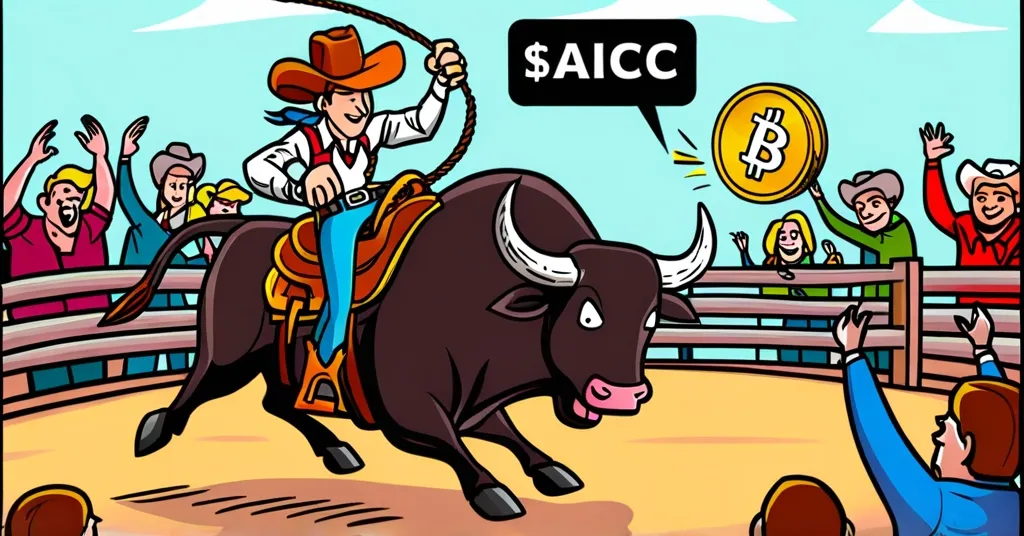Bankless VC’s $AICC Token Dump Sparks Outrage: Trust Tested in Crypto

Bankless Hosts Face Backlash Over $AICC Token Sales: A Trust Test in the Crypto World
In the world of crypto, trust is everything. But what happens when those you trust most seem to break that trust? The hosts of the popular crypto podcast “Bankless” found themselves in hot water after their venture capital arm, Bankless VC, sold a significant amount of $AICC tokens shortly after the token’s public launch.
- Bankless VC sold $AICC tokens post-launch.
- Significant profits made from early sales.
- Apologies issued and corrective actions taken by Bankless.
- Lack of token lockups or vesting schedules criticized.
The $AICC Token Sale
The $AICC tokens were part of an investment in a project launched by ejaaz, a co-host on an affiliated podcast. For those unfamiliar, $AICC is a token used in the ejaaz project, while SOL is the native cryptocurrency of the Solana blockchain. Each Bankless co-host received 9 million $AICC tokens for their modest 5 SOL (~$950) investments. Meanwhile, Bankless VC, with an investment of 2 SOL (~$380), received 3.64 million $AICC tokens. The controversy arose when Bankless VC sold 300,000 $AICC tokens for 344 SOL ($65,300), representing 8% of their allocation, at an initial sale price of $0.22, significantly higher than the $0.05 to $0.11 range seen in the following 24 hours.
Bankless VC’s Response
David Hoffmann, one of the Bankless hosts, addressed the situation publicly, admitting the mistake and outlining the corrective actions:
Agree that Bankless Ventures should not be selling tokens – that was an impulsive mistake.
Bankless announced plans to repurchase the sold tokens and are considering a self-imposed vesting schedule for future sales. For those new to the space, a vesting schedule spread out the release of tokens over time, preventing early sales like this. Ben Lakoff, a general partner at Bankless VC, initiated the sales but, according to Ryan Sean Adams, another Bankless co-host, did so impulsively without full context, treating the tokens like a meme coin:
Ben did not have context for this, and was in the mindset of trading a local high as you might trade a meme coin you’re bullish on – or there’s no way he would have done this – huge mistake, first time something like this has happened – he’s devastated
Bankless VC’s Ben Lakoff might have been trading like a meme coin cowboy, but even cowboys need to know the rules of the range.
The $AICC Project’s Role
The $AICC project drew criticism for not imposing any token lockups or vesting schedules, which could have potentially mitigated such early sales. Token lockups are periods when tokens cannot be sold, providing stability to the project’s ecosystem. Ryan Sean Adams pointed out this oversight, emphasizing the need for better project management practices in the crypto space.
Lessons for the Crypto Community
This incident serves as a stark reminder of the ongoing challenges within the cryptocurrency ecosystem. The tension between the ideals of decentralization—freedom, privacy, and disrupting the status quo—and the practical realities of managing projects and investments is palpable. While Bankless’s quick acknowledgment and corrective actions reflect a growing sense of accountability among crypto influencers, it’s clear that the industry still has a long way to go in balancing innovation with ethical practices.
From a Bitcoin maximalist perspective, incidents like these remind us of the importance of Bitcoin’s simplicity and security. While altcoins and other blockchains play their unique roles in the financial revolution, Bitcoin’s lack of such token sale controversies underscores its potential as the bedrock of decentralized finance. However, we must acknowledge that altcoins and other innovative protocols fill niches that Bitcoin might not serve well, contributing to a diverse and vibrant crypto ecosystem.
Key Questions and Takeaways
- What were the consequences of Bankless VC selling $AICC tokens?
Bankless VC sold 300,000 $AICC tokens shortly after their public launch, leading to significant backlash from the community due to the higher sale price compared to subsequent trading values.
- Who was responsible for the $AICC token sales at Bankless VC?
Ben Lakoff, a general partner at Bankless VC, was responsible, having acted impulsively without full context, treating the tokens like a meme coin.
- What steps did Bankless take to address the token sale issue?
Bankless hosts repurchased the sold tokens and are discussing implementing a self-imposed vesting schedule for future sales.
- What was the role of the $AICC project in the token sale controversy?
The $AICC project did not impose any token lockups or vesting schedules, which contributed to the early sales and subsequent controversy.
- How did the Bankless hosts react to the public criticism?
The hosts issued apologies, acknowledged the mistake, and outlined steps to rectify the situation and prevent future occurrences.
As the crypto world rides the rollercoaster of innovation and ethics, incidents like these remind us that the journey to decentralization is bumpy but enlightening. The crypto community must continue to learn, adapt, and hold each other accountable to build a more transparent and fair financial future.

